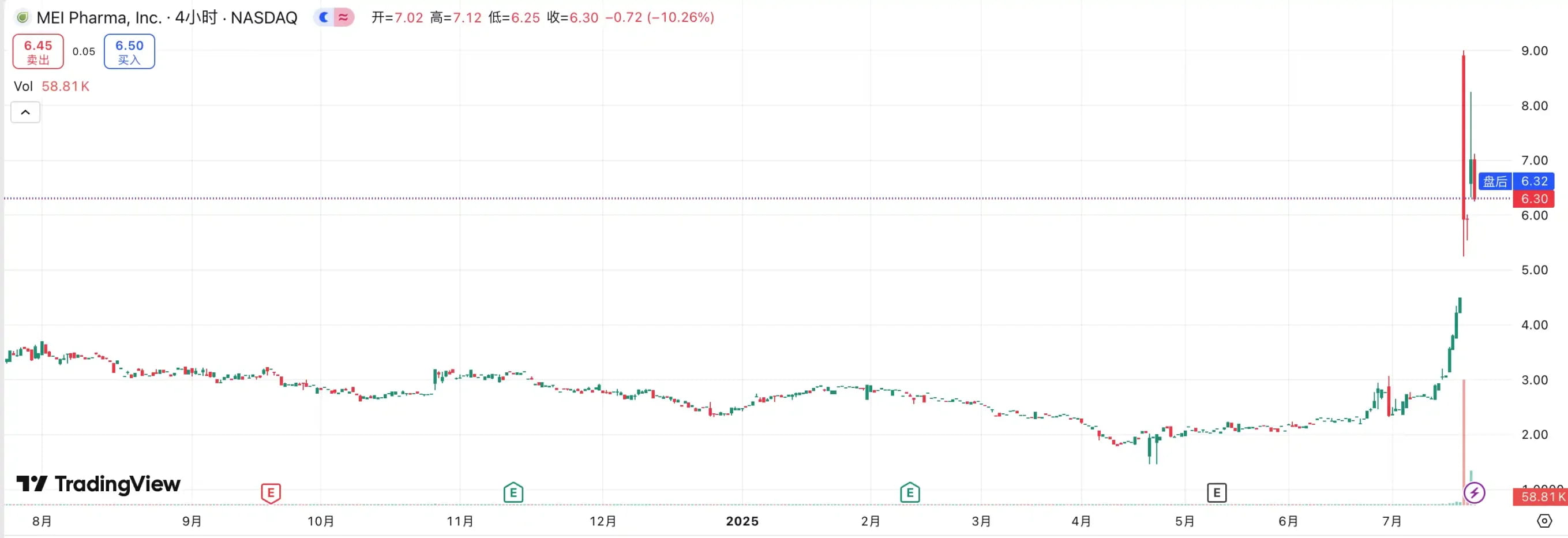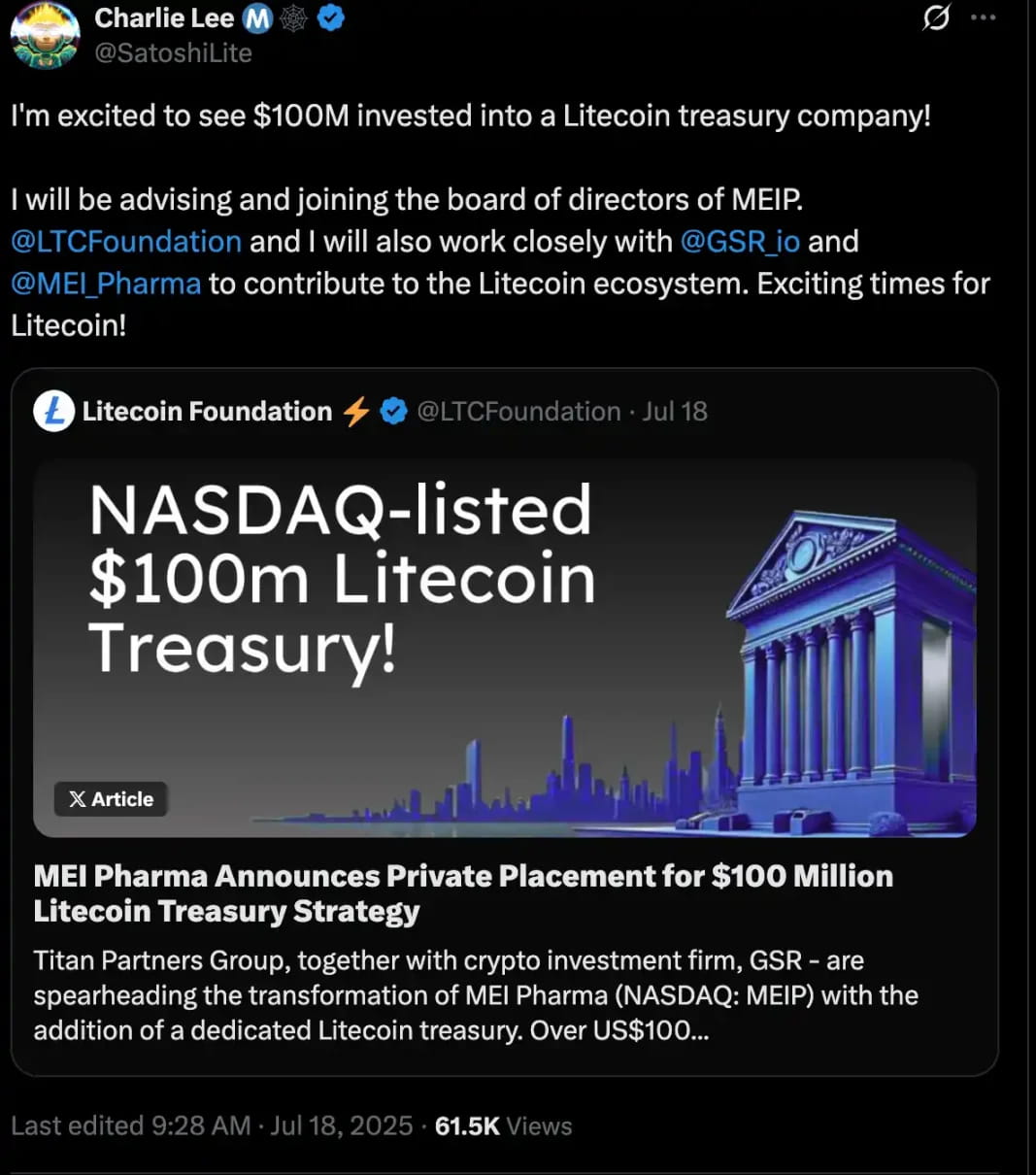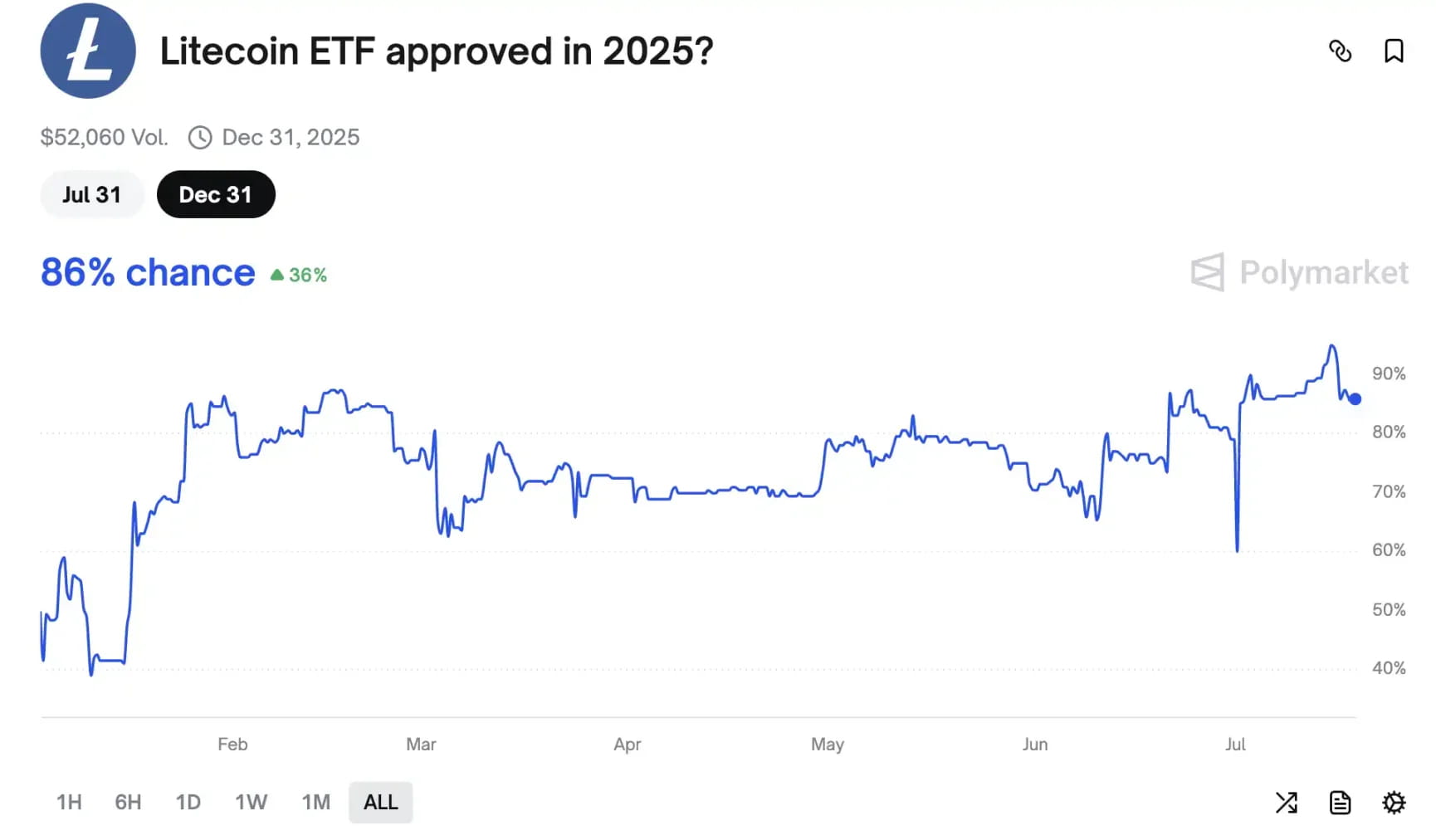Written by: kkk
On July 19, American pharmaceutical company MEI Pharma (stock code: MEIP) announced a strategic transformation, promoting the establishment of a dedicated Litecoin treasury strategy. Over $100 million in funding commitments have already been made for this project.
As part of the transaction, this biotech company will appoint Litecoin founder Charlie Lee to its board of directors. GSR will also gain a board seat and hold an important position on the company's digital assets and funds management advisory committee. Additionally, the Litecoin Foundation has also invested in MEI Pharma, as the company's treasury strategy aligns closely with the Litecoin Foundation's core mission of promoting global Litecoin adoption.
Following the announcement, MEIP's stock price soared by 83.37% in pre-market trading on Friday, continuing the previous day's increase of 16.58%, with a peak reaching $9, and currently stabilizing at $6.30. The trading volume for the day exceeded 13 million shares, far surpassing the average daily level of 26,000 shares over the past three months. This movement not only reflects market optimism regarding the company's blockchain transformation but also marks the formal launch of another 'altcoin micro-strategy' model following mainstream crypto assets like ETH, SOL, and BNB, heralding a new chapter for Litecoin (LTC) in institutional allocation.

MEI Pharma completes strategic transformation: the first publicly traded company to establish a Litecoin strategic reserve
MEI Pharma, Inc. is a biopharmaceutical company focused on the development of small molecule drug compounds, with core R&D projects including CDK inhibitor Voruciclib for the treatment of B-cell malignancies and mitochondrial-targeted anticancer drug ME-344. The company was founded on December 1, 2000, and is headquartered in San Diego, California, USA.
On July 19, 2025, MEI Pharma announced its alignment with blockchain finance, launching a new round of private equity investment (PIPE) transactions, and plans to incorporate Litecoin (LTC) into its company asset allocation, becoming the first publicly traded biotech company to use LTC as a primary financial reserve asset.
According to the announcement, this round of financing is co-led by Titan Partners Group and cryptocurrency trading firm GSR, planning to issue 29,239,767 shares of common stock or equivalent prepaid warrants at a price of $3.42 per share, with a total financing scale of approximately $100 million. The transaction is expected to be completed around July 22, 2025, subject to customary regulatory and closing conditions.
Behind this financing is not just a capital operation, but it also indicates that MEI is undergoing a deep strategic transformation. The company stated that it has systematically evaluated the sustainability of traditional biotech business models and decided to embrace the fields of blockchain and decentralized finance (DeFi), planning to restructure its company treasury with Litecoin as the core asset and to establish long-term cooperation with the Litecoin Foundation and GSR.
In response to this collaboration, Charlie Lee stated: 'Since its establishment in 2011, Litecoin has always adhered to the principles of speed, security, and decentralization. I am pleased to see a public company like MEI embrace these principles. This not only reflects the growing confidence of institutions in LTC but also lays the foundation for its further expansion in traditional capital markets.'

Why choose Litecoin
Litecoin is one of the earliest altcoins to enter the market, created by former Google engineer Charlie Lee in 2011. Its core architecture is based on Bitcoin's open-source code and has undergone numerous optimizations and upgrades. Compared to Bitcoin, Litecoin generates blocks faster, uses the Scrypt proof-of-work (PoW) algorithm, making it more suitable for regular hardware mining, thereby lowering the participation threshold. Its total supply is set at 84 million coins, possessing deflationary characteristics similar to Bitcoin—every 840,000 blocks will trigger a block reward halving mechanism.
As a representative of the first generation of altcoins, Litecoin has always been committed to improving on-chain transaction efficiency and scalability, with advantages such as low transaction fees and fast processing speeds. In recent years, Litecoin has gradually expanded its payment use cases, including travel companies, convenience stores, real estate agencies, and online e-commerce. In 2021, the Litecoin Foundation announced a partnership with a financial service provider to issue Visa debit cards, enabling users to convert LTC to USD in real-time for consumption payments, further consolidating its practical value.
Since the establishment of Litecoin in 2011, Charlie Lee has always been the core driving force behind this ecosystem. He has advocated for technological innovation and has led several key upgrade processes—including the selective integration of privacy features in Litecoin and the activation of Segregated Witness. Charlie Lee has also invested heavily in promoting Lightning Network experiments, pool collaborations, and developer community building, laying a solid foundation for the long-term development of both the Bitcoin and Litecoin networks.
Now, his deep involvement with MEI Pharma's Litecoin treasury has once again boosted market confidence in the 'Litecoin Treasury' strategy. As emphasized by the Litecoin Foundation in the announcement: 'For 14 years, Litecoin has consistently provided a stable, low-cost, and easily accessible network for millions of users.' This collaboration with MEI not only means that Litecoin has been incorporated into the financial structure of a US publicly traded company for the first time, but it also marks a strategically significant institutional-level financial experiment undertaken with direct involvement from the founder.
Meanwhile, market expectations for institutional involvement in Litecoin are rapidly heating up. According to data from the decentralized prediction platform Polymarket, as of the end of 2025, the probability of the U.S. Securities and Exchange Commission (SEC) approving a Litecoin spot ETF has reached 86%. This not only reflects investor optimism regarding Litecoin's regulatory prospects but also indicates its gradual entry into the ranks of 'mainstream assets' amidst the compliance wave.
Once the spot ETF is approved, Litecoin will join Bitcoin and Ethereum as a core target in traditional financial investment portfolios, providing institutional funds with a legitimate and compliant allocation path. This will enhance LTC's market liquidity and valuation anchoring, while further reinforcing its market positioning as a 'payment-type digital asset,' bridging the on-chain world with Wall Street capital.

Summary
With MEI Pharma becoming the first publicly traded company to incorporate LTC into its financial reserves, following the 'micro-strategy model' initiated by mainstream tokens such as Ethereum, BNB, and SOL, Litecoin has officially joined this institutional accumulation camp, announcing the launch of another altcoin 'treasury path.' On the day of the announcement, Litecoin forcefully broke through the downward channel, rising over 6% within 24 hours, with its price reaching $106, and subsequently continuing the upward trend to $115. This not only marks a re-evaluation of LTC's asset attributes but also further reinforces the role of 'altcoin micro-strategy' as a catalyst for funds in this bull market. With the added concept of ETFs and accelerated institutional accumulation, the altcoin season is quietly beginning.



